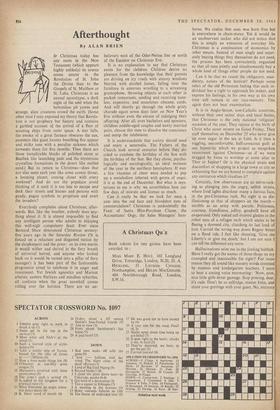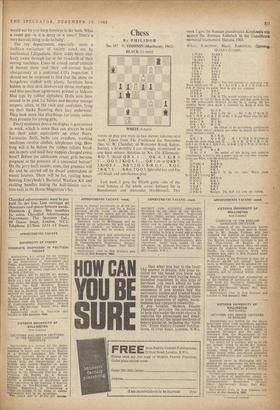Afterthought
By ALAN BRIEN IF Christmas today has any roots in the New Testament (which appears highly unlikely) its source seems nearer to the Revelation of St. John the Divine than to the Gospels of St. Matthew or St. Luke. Christmas is an annual apocalypse, a dark night of the soul when the bottomless pit yawns and strange, alien creatures crowd the earth. (Some other time I may expound my theory that Revela- tion is not prophecy but history and 'contains a garbled account of the arrival of a fleet of scouting ships from outer space. A star falls, the smoke of a .great furnace obscures the sun, monsters like giant locusts breathing fire appear and strike men with a peculiar sickness which torments them for five months. Then there are those inexplic*able blocks of polished stone at Baalbek like launching pads and the mysterious crystalline formations in the desert like melted sand.) But to return to Christmas—does that not also seem each year like some cosmic threat, a looming planet, coming closer with every weekend? And do not the populace avoid thinking of it until it is too late to escape and deck their streets and houses and persons with gaudy, pagan symbols to propitiate and avert the invaders?
Everybody complains about Christmas, after- wards. But, like the weather, nobody does any- thing about it. It is almost impossible to find any intelligent person who admits to enjoying this well-nigh compulsory feast. Ever since Bernard Shaw denounced Christmas seventy- five years ago in the Saturday Review ('It is forced on a reluctant and disgusted nation by the shopkeepers and the press: on its own merits it would wither and shrivel in the fiery breath of universal hatred; and anyone who looked back on it would be turned into a pillar of fiery sausages') it has been part of the fashionable progressive creed to celebrate it in anger and resentment. Yet Jewish agnostics and Marxist atheists, austere Puritans and mindless sybarites, all conform when the great snowball comes rolling over the horizon. There are no un-
believers west of the Oder-Neisse line or north of the Equator on Christmas Eve.
It is no explanation to say that Christmas exists for the children. Children derive no pleasure from the knowledge that theit parents are driving on icy roads with steamy windows blurred with alcohol fumes, falling over the furniture in amorous wrestling to a screaming gramophone, throwing objects at each other in packed restaurants, sending and receiving taste- less, expensive, and sometimes obscene, cards. And will shortly go through the whole grisly charade again seven days later on New Year's Eve without even the excuse of indulging their offspring. After all, even bachelors and spinsters, childless middle-aged couples and newly married pairs, choose this time to dissolve the conscience and unzip the inhibitions.
It is understandable that society should need and enjoy a saturnalia. The Fathers of the Church took several centuries before they de- cided to combine the birthday of the Son with the birthday of the Sun. But they choSe, psycho- logically and sociologically, an ideal moment of the year in the northern hemisphere. If ever a few vitamins of cheer were needed to pep up a metabolism infected with germs of angst, it is at the end of December. But what is mys- terious to me is why we nevertheless hate our few days of misrule and licence so much.
Can it really be that we look for once a year into the red face and bloodshot eyes of commercialism? Christmas is undoubtedly the Feast of Santa Hire-Purchase Clause, the Accountants' Orgy, the Sales Managers' Jam-
boree. We realise that man was born free but is everywhere in chain-stores. Yet it would be an unobservant sucker who did not notice that this is simply an extension of everyday life. Christmas is a continuation of economics by other means. Instead of men singly and separ- ately buying things they themselves do not need, the process has been conveniently organised so that all men jointly and simultaneously buy a whole load of things other people do not need.
Can it be that we resent the obligatory, man- datory, nature of the festival?, Perhaps some relics of the old Protestant feeling that each in- dividual has a right to approach his maker, and express his feelings, in his own way at his own time still remain in our race-memory. This again does not bear examination.
It is in Anglo-Saxon, non-Catholic countries, without their own saints' days and local fiestas, that Christmas is the only national 'religious' occasion of the year. They rejoice at the birth of Christ who never mourn on Good Friday. They stuff themselves on December 25 who never give up even sugar in the tea at Lent. Is it then 'a niggling, uncomfortable, half-conscious guilt at our hypocrisy which we project as outspoken resentment against Christmas—as if we were dragged by force to worship at some altar to Thor or Jupiter? Or is the physical strain and discomfort of shopping in a large town or city so exhausting that we are bound to complain against any institution which ritualises it?
Certainly, few observances are so nerve-rack- ing as plunging into the angry, selfish streets, where livid lights discolour many a furious face, in the pre-Christmas rush. No sight is as dis- illusioning as that. of shoppers on the march— terrible as' an army with parcels. Politeness, courtesy, friendliness, jollity, goodwill have all evaporated. Only naked self-interest gleams in the robot eyes of a refugee mob which seems to be fleeing a doomed city, clutching its last load of loot. Carried the wrong way down Regent Street on a flood tide, I feel like shouting, 'Give me Liberty's or give me death,' but I am not sure 1 can tell the difference any more.
Hallucinations seize me in the jostling hubbub. Have I really got the names of those shops on my crumpled and inaccessible list right? For some reason they all sound like nursery words invented by nannies and kindergarten teachers. I seem to hear a cooing voice murmuring: 'Now, now, nice little girls never gamage. Stop ponting, dear, it's rude. Don't be so selfridge, master John, and share your gorringe with your guest. No, mummy
would not let you keep hamlet's in the bath. What a sweet pet--is it a derry or a toms? That's a very harrods thing to do to baby'.
The toy departments, especially, seem a Swiftian caricature of society acted out by • mechanical Lilliputians. Slave teddy-bears end- lessly sweat through fur at the treadmill of their sewing machines. Lines of cowed metal animals in human dress nod their sub-normal heads obsequiously at a continual CO's inspection. I should not be surprised to find that the shiny tin bungalows stuffed with plastic furniture have hidden in their desk drawers cut-throat mortgages and hire-purchase agreements printed in hideous blue type by rubber alphabets. Dolls now have ceased to be pink fat babies and become teenage scxpots, often, in the rush and confusion, lying on their backs flaunting their lacy underwear. They look more like playthings for lonely sailors than presents for young girls.
Every miniature device on display is guaranteed to work, which is more than can always be said for their adult equivalents on other floors. Lavatories flush, baths can overflow, washing machines revolve clothes, telephones ring. How long will it be before the rubber infants break out in spots and need their nappies changed every hour? Before the adolescent ersatz girls become pregnant at the pressure of a concealed button? On the jerry-built estates, soon, tiny grannies will die and be carried off by dwarf undertakers in mimic hearses. There will be fat, rattling boxes housing Everybody's Bacterial Warfare Kit and exciting bundles hiding the hanifesize cat-'o- nine-tails in the Home Magistrate's Set.































 Previous page
Previous page